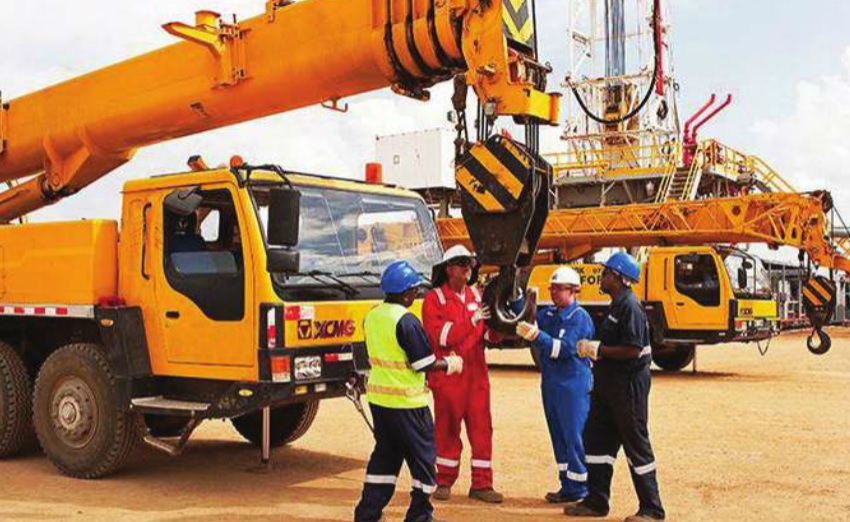
Foreigners could take lion’s share of oil and gas jobs as Uganda lags behind in building local capacity
The government recently issued eight production licences to Tullow Uganda Operations Pty Ltd and Total E&P Uganda BV, a development that gives the oil companies the green light to finally proceed with developing Uganda’s oil fields in the Lake Albert area in mid-western Uganda. Ideally, that should mean that an avalanche of jobs for Ugandans is on the cards. But is it? Well, industry experts don’t think so.
Elly Karuhanga, the chairman of the Uganda Chamber of Mines and Petroleum (UCMP), told the sixth annual general meeting in Kampala on Sept.14 that construction of the infrastructure necessary before oil production starts should give Ugandans “a lot of work.”
At the same event, Dozith Abeinomugisha, an assistant commissioner at the Energy ministry while updating the chamber members on the latest developments in Uganda’s oil and gas sector, said the government expects investments in the upstream sector to be in the region of $8-10 billion, excluding investments for the refinery and crude oil pipeline—expected to cost about $4 billion each. Abeinomugisha noted that Ugandans should “brace themselves” to take up the jobs considering that a lot of manpower in oil field development activities is needed.
His minister Irene Muloni reminded Ugandans about the sheer number of jobs that are about to be made available during the development phase shortly after issuing the oil companies the production licences.
Muloni said about 70% of the jobs in these developments are expected to be at technician/artisan level, 25% as casual workers and only 5% as professionals – geoscientists, engineers and administrators.
Over the next three years, many activities for the engineering, procurement and construction phase for the refinery and pipeline projects are expected to increase but the million dollar question remains; are Ugandans prepared enough to tap into the job opportunities?
According to the seventh and eighth objectives of the 2008 National Oil and Gas Policy, the international oil companies are required to employ Ugandans and utilise locally-available goods and services.
Are these workers available to start work at the go?
Abeinomugisha says the government is developing a national supplier database—a platform for potential suppliers – to attain industrial recognition and take advantage of the opportunities in the sector.
A baseline survey conducted in 2013 by the three joint venture partners [CNOOC, Tullow Oil and Total] noted that the sector is likely to generate 100,000-150,000 direct and indirect jobs. The job estimates were based on studies and experiences from oil-producing countries such as Trinidad & Tobago. The study titled, “A Survey to foster opportunities for Ugandans in the Oil and Gas Sector,” also showed that as many as 13,000 jobs would be available in the construction phase alone, which is expected to last at least three years.
But the survey indicated that there were limited qualified civil craftsmen, drivers, mechanics and technicians among others. It further noted that some jobs such as welders and electrical technicians could be ‘dried out’ thus depriving other sectors. The survey recommended that focus should be put on building capacity in civil construction, electrical and mechanical fields.
Since oil exploration started ten years ago, the government has been making moves to implement local content—an arrangement with international oil companies where there must be a certain percentage of locally produced materials, personnel, financing, goods and services rendered to the oil and gas industry measured in monetary terms.
In order to improve on the chances of Ugandan participation in the industry, the government in 2009 established a technical oil and gas institute at Kigumba in Kiryandongo District as part of the country’s strategy to establish a regional centre of excellence for training Ugandans.
Abeinomugisha says the government financial records show that between 20102014, there was an increase in value of spending in the oil and gas sector to about $1.1 billion of which $329 million (28% of total value spent) remained in the country.
He adds that if only during the development phase that percentage rose to about 50%, Uganda would not need to wait for production so Uganda could start earning money from its oil.
He says the development phase itself could transform Uganda into lower middle income level if a major chunk of that money remains here. “We only need to position ourselves and take the bigger chunk of money expected to be spent in the development phase,” he says.
The government has in the last three months developed a database for suppliers of goods and services at the Energy Ministry to ensure people who have skills register with the government—a move that is also meant to identify gaps.
 The Independent Uganda: You get the Truth we Pay the Price
The Independent Uganda: You get the Truth we Pay the Price


